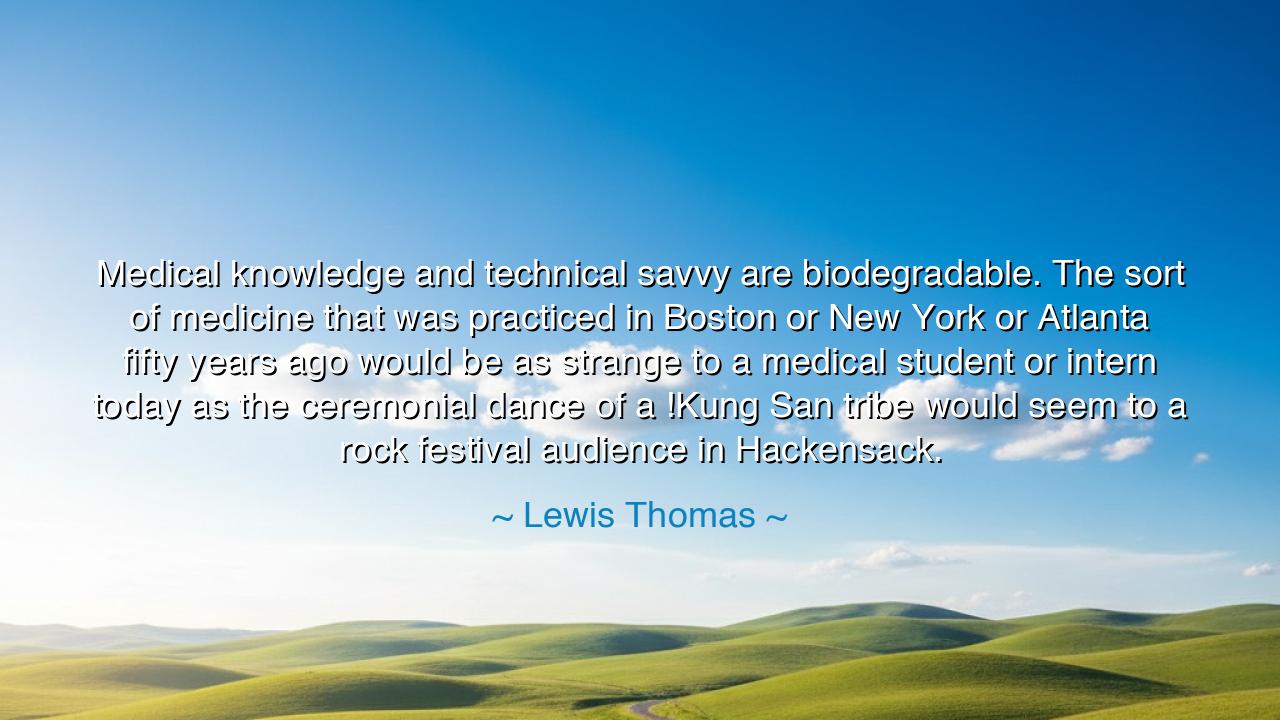
Medical knowledge and technical savvy are biodegradable. The sort
Medical knowledge and technical savvy are biodegradable. The sort of medicine that was practiced in Boston or New York or Atlanta fifty years ago would be as strange to a medical student or intern today as the ceremonial dance of a !Kung San tribe would seem to a rock festival audience in Hackensack.






Hearken to the wisdom of Lewis Thomas, a sage of modern medicine, whose words reveal the transient nature of human knowledge. He observes that medical knowledge and technical savvy are biodegradable, ever subject to decay and transformation as time marches forward. The practices of Boston, New York, or Atlanta fifty years ago are now almost alien to the students and interns of today, strange and unfamiliar as the ceremonial dances of a !Kung San tribe might seem to an audience at a rock festival in Hackensack. Thomas reminds us that even the loftiest accomplishments of one generation may fade, replaced by new insight and understanding, leaving only the echo of progress behind.
Since antiquity, philosophers and healers have recognized the impermanence of knowledge. Hippocrates’ teachings, once revolutionary, are now viewed as rudimentary compared to modern medical science. Yet in their time, they transformed lives and shaped the understanding of disease, ethics, and the art of healing. Thomas’ words evoke this same awareness: what is revolutionary today may become quaint, obsolete, or incomprehensible tomorrow, and yet it forms the foundation upon which future wisdom is built.
Consider the story of antibiotics, discovered in the early 20th century. Penicillin, once a miraculous cure, revolutionized medicine, saving countless lives. Yet today, its original applications, methods of production, and even the societal awe it inspired seem almost foreign to modern students, who encounter antibiotics as commonplace tools of healing. In this way, knowledge evolves, and what was once cutting-edge becomes historical context, a reminder that the tools of one era may appear strange or ceremonial to the next.
Thomas’ analogy to the ceremonial dance of the !Kung San tribe highlights a profound truth: cultural and technical practices are shaped by context. Just as a rock festival audience cannot immediately comprehend the meanings and subtleties of a ritual dance, modern minds struggle to fully grasp the methods of medical practice from half a century prior. The lesson is clear: understanding requires humility, a recognition that wisdom is relative, and that every generation builds upon the layered foundations of the past.
History teaches us that adaptation is the constant of progress. The medical student of today must embrace new technologies, new understandings of the human body, and new approaches to disease, while acknowledging that yesterday’s knowledge, though outdated, enabled this evolution. The ancients understood this principle in other realms as well: scholars, builders, and strategists passed down methods that were improved upon, not discarded lightly. Thomas reminds us that the impermanence of knowledge is not a failing but a necessary engine of advancement.
From this insight emerges the moral: embrace learning, adapt to change, and respect the wisdom of the past without clinging to it. Knowledge is living, not static. It must be renewed, questioned, and reinterpreted continuously. In medicine, as in all human endeavors, what is treasured today may be puzzling tomorrow. The true healer, like the true scholar, recognizes the transient nature of mastery and cultivates both curiosity and humility.
Practical guidance flows naturally from this reflection: dedicate yourself to lifelong learning, remain open to innovation, and approach historical knowledge with reverence and understanding. Study the foundations of your field, but do not be bound by them; allow your mind to evolve as new discoveries emerge. Honor what came before while forging what comes next, acknowledging that wisdom is a river, never stagnant, always flowing toward greater understanding.
So heed this counsel from Lewis Thomas: the mastery of one generation becomes the mystery of the next. Let this awareness cultivate humility, curiosity, and perseverance. In recognizing the impermanence of knowledge, we embrace the eternal journey of learning, innovation, and adaptation. Just as the ceremonial dance and ancient practices endure in memory and influence, so too does medical knowledge ripple across time, shaping the healers of today and the visionaries of tomorrow.






AAdministratorAdministrator
Welcome, honored guests. Please leave a comment, we will respond soon